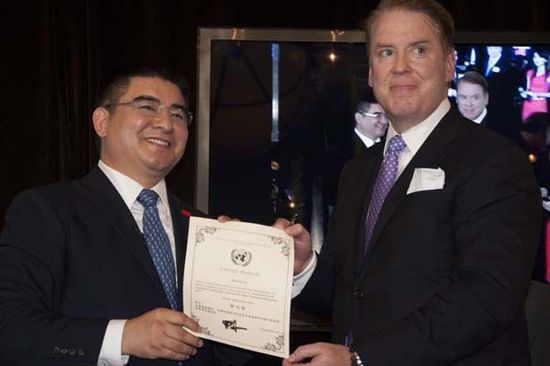Chen caught in con game as UN certificate turns out fake
Shanghai Daily, July 9, 2014 Adjust font size:
China's high-profile philanthropist Chen Guangbiao has been duped into making a donation of US$30,000 for a bogus good samaritan title during a charity tour in the United States last month.

Chen caught in con game as UN certificate turns out fake
On June 25, Chen hosted a lunch for hundreds of homeless New Yorkers at Central Park's Loeb Boathouse — a venue for luxurious events.
He was bestowed the title of "Global Peace and Goodwill Ambassador and World's Most Prominent Philanthropist" by Patrick Donohue, who introduced himself as chairman of the China Foundation for Global Partnership.
The certificate presented to him carried the United Nations' emblem, implying it was backed by the intergovernmental organization. But the fraud came to light with an eye-catching bloomer with the United Nations spelled as "United Nation."
"Well, for your information, our English title is 'the United Nations' rather than 'United Nation,'" the UN posted on its official microblog account on Monday night, clearly suggesting it had nothing to do with the New York-based foundation.
Large media presence
A Shanghai-based news website (www.thepaper.cn) published an interview with Chen on Sunday which carried a picture of the certificate.
Chen believed that the title was official because he thought the foundation wouldn't dare to cheat him in front of nearly 100 media organizations, including BBC and CNN.
He tried to reconfirm it with Zhou Lulu, who claimed to be an executive of the foundation, but failed to reach her. Zhou also deleted all the pictures of the banquet from her social networking site. It was then Chen realized he might have been cheated.
"Will the public think I am very foolish?" he asked in a follow-up interview with the website on Monday.
Chen said Zhou contacted him on June 24 through a volunteer from Columbia University. As he was traveling without his assistants, he relied on university students to launch his charity campaign.
Zhou told Chen she could get him a UN appreciation certificate for his charitable work but wanted Chen to make a donation of between US$50,000 to US$60,000 to support the foundation.
"I have never bought any awards," Chen told the website after admitting he donated US$30,000 to them.
In return, Zhou gave him a receipt, making it clear that the money was a donation. But it was signed by Zhou in her personal capacity and not on behalf of the foundation.
On its official website (c3partners.org), it says the "China Foundation for Global Partnership is founded under the United Nations Millennium partnership goal initiative." The foundation claims its purpose is to help the UN and leading Chinese businesses to build dynamic collaborations. The website does not mention who founded the organization or who invested in it.
It did not have an address or even a telephone number. The only way of contacting them was through email or leaving messages on the website.
While some netizens suspected that Chen might be the brains behind the foundation, Chen says he was duped.
"I have contacted my friends in the US. If I was really cheated, I will ask Zhou to return my money. If she refuses, I will call the police," Chen said.
Chen, one of China's richest with net worth 5 billion yuan, built his fortune from recycling.
But he came into public eye with a series of public stunts including smashing his own Mercedes-Benz to promote a low-carbon life, and donating pigs, sheep and tractors to villagers, and holding his own personal concert.
In June, he went to the US to "spread the spirit of Lei Feng." Lei is a name known throughout China for helping others during the 1960s.
On June 16, Chen took out a full-page advertisement in The New York Times, seeking 1,000 homeless. He promised to offer free lunch and US$300 in cash each. However, many of them were left disappointed as only 250 were allowed in and only a few got the money.
Chen said that was because of safety concern and lack of space.
He said he paid a further nearly US$90,000 to the New York City Rescue Mission to distribute them to the needy.

